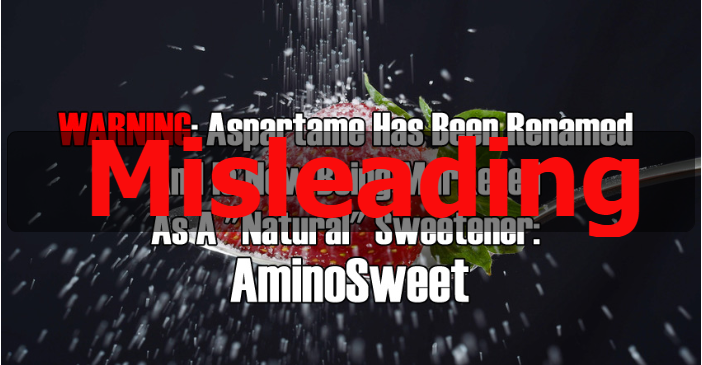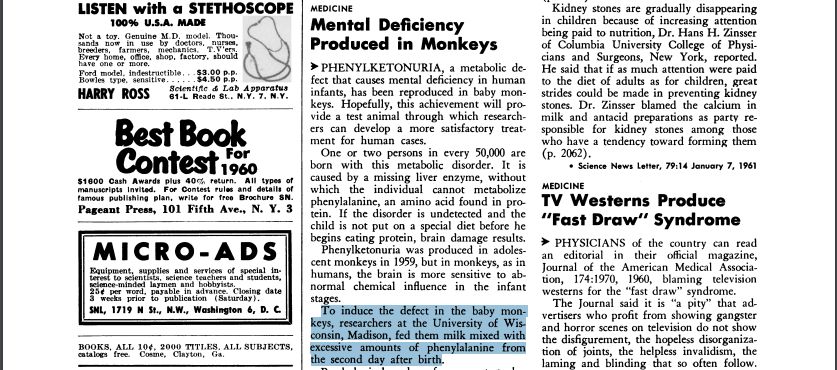
Aspartame is not marketed as AminoSweet on food labels
- This article is more than seven years old.
- Published on August 30, 2018 at 20:30
- Updated on May 22, 2019 at 00:46
- 3 min read
- By AFP Canada
An article shared more than 226,000 times states that aspartame has been renamed AminoSweet and is being marketed as a “natural” sweetener. While a company that produces aspartame did rename its product for marketing purposes in 2010, this was a move by only one company manufacturing aspartame. On food labels, aspartame still cannot be listed by its brand name in Canada and the US, and must be marketed as an artificial sweetener.
What are we verifying ?
An article first published in November 2015, which continues to circulate on Facebook, claims that the artificial sweetener aspartame is being renamed “in a move to cover up it’s [sic] bad reputation.”
What do we know ?
In 2010, the Ajinomoto Group, one of the world’s largest producers of aspartame -- just below 30 percent of the global market, according to its own estimates -- rebranded the aspartame it produces. Their aspartame brand became AminoSweet, although it must still legally be listed as aspartame on the label when used in consumer goods in Canada and the United States.
“AminoSweet aspartame products are for industrial use, therefore this brand name is not used for marketing consumer food products,” Kan Takahashi, a spokesperson for the Japanese Ajinomoto Company, told AFP in an email.
Many articles claiming to highlight aspartame’s effects on the human body abound, which helps explain the suspicion around a potential name change.
This is an example of the claim on Twitter.
#Aspartame now being marketed as natural sweetener, name changed to 'AminoSweet'. https://t.co/KBKVr1LGhb #health
— HealthRanger (@HealthRanger) November 12, 2017
As proof of the negative health impacts of aspartame, the Herbs Info article cites a 1967 study on monkeys by Dr. Harold Waisman.

Dr. Harry Waisman did not conduct aspartame safety tests, but rather studied the effects of phenylalanine, which is one of three components present in aspartame (along with methanol and aspartic acid).
Waisman conducted research at the University of Madison Wisconsin on phenylketonuria (PKU), an inherited condition that increases levels of phenylalanine in the body due to the absence of the enzyme needed to break it down.
To reproduce the PKU condition, Waisman fed six baby rhesus monkeys milk containing enormously high levels of phenylalanine. None of the monkeys died, but most developed intellectual disabilities.
Governments around the world have set up strict regulations around the amount of aspartame that food can contain. The acceptable daily intake (ADI) for aspartame is set at 40 milligrams per kilogram of body weight per day in Canada and at 50mg/kg a day in the US.
“The ADI is set to be about 100 times less than the smallest amount that might cause health concerns, based on studies done in lab animals,” according to the American Cancer Foundation.
For comparison, Waisman’s monkeys were fed 3 grams of pure phenylalanine, not aspartame, per kilogram of body weight per day for several years.
What conclusion can be drawn ?
The Ajinomoto Group rebranded its aspartame product in 2010, but the strict regulations surrounding food labelling and the acceptable daily intake for aspartame did not change.
While aspartame’s effects on the human body continue to be studied, the US FDA says on its website, “Aspartame is one of the most exhaustively studied substances in the human food supply, with more than 100 studies supporting its safety.”
UPDATE: This article was updated on August 31, 2018 to add links to the biography of Dr. Harry Waisman and to his 1965 PKU study. UPDATE: This article was updated on May 21, 2019 to reflect the changes Herbs Info made to their article.
Copyright © AFP 2017-2026. Any commercial use of this content requires a subscription. Click here to find out more.
Is there content that you would like AFP to fact-check? Get in touch.
Contact us
